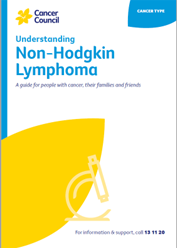- Home
- Non-Hodgkin lymphoma
- Treatment
- Steroid therapy
Steroid therapy for non-Hodgkin lymphoma
Steroids (also known as corticosteroids) are substances made naturally in the body. They can also be produced artificially and used to reduce inflammation (redness, swelling and/or pain). The most commonly prescribed steroid for non-Hodgkin lymphoma is prednisolone.
Learn more about:
Having steroids
You may be given steroids with chemotherapy to increase the effect of the chemotherapy, help destroy the lymphoma, and treat any nausea or vomiting caused by the chemotherapy. Steroids are usually taken as tablets, but can also be given into a vein (intravenously).
Side effects of steroid therapy
Steroid therapy can cause various side effects, which depend on the dose prescribed and how long you have treatment. Most side effects gradually go away after you stop taking the medicine.
When taken for a short period of time, steroids may increase your appetite, make you feel restless, make it harder to sleep or stay asleep (insomnia), and cause weight gain and mood changes.
If you need to take steroids for several months, you may have a build‑up of fluid in the body (known as fluid retention), high blood pressure and high blood glucose levels (which may lead to diabetes in some people). There is an increased risk of developing stomach ulcers, so your doctor may prescribe a drug to help prevent ulcers while you are on steroid therapy.
You may also be more likely to get infections. Your treatment team can help you manage or reduce side effects, especially if they are causing you discomfort.
Starting steroids and chemotherapy can cause a large number of cancer cells to break down quickly and be released into the bloodstream. This can increase the levels of certain chemicals in the blood, causing a condition called tumour lysis syndrome (TLS). This can affect your kidney function and the levels of electrolytes in your blood. Your doctor will monitor you and may give you fluids and a drug called allopurinol to help prevent TLS.
→ READ MORE: Targeted therapy for Hodgkin lymphoma
Podcast: Making Treatment Decisions
Listen to more episodes from our podcast for people affected by cancer
More resources
Dr Puja Bhattacharyya, Haematology Staff Specialist, Western Sydney Local Health District, Blacktown Hospital; A/Prof Christina Brown, Haematologist, Royal Prince Alfred Hospital and The University of Sydney; Dr Susan Carroll, Senior Staff Specialist, Radiation Oncology, Royal North Shore Hospital and The University of Sydney; Jo Cryer, Clinical Nurse Consultant, Haematology, St George Hospital; Marie Marr, Consumer; Katelin Mayer, Clinical Nurse Consultant, Cancer Outreach Team, Nelune Comprehensive Cancer Centre, Sydney; Vanessa Saunders, 13 11 20 Consultant, Cancer Council NSW; Elise Toyer, Haematology Clinical Nurse Consultant, Blacktown Hospital.
View the Cancer Council NSW editorial policy.
View all publications or call 13 11 20 for free printed copies.

